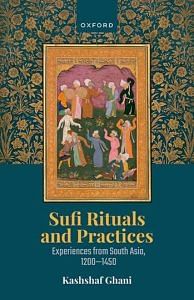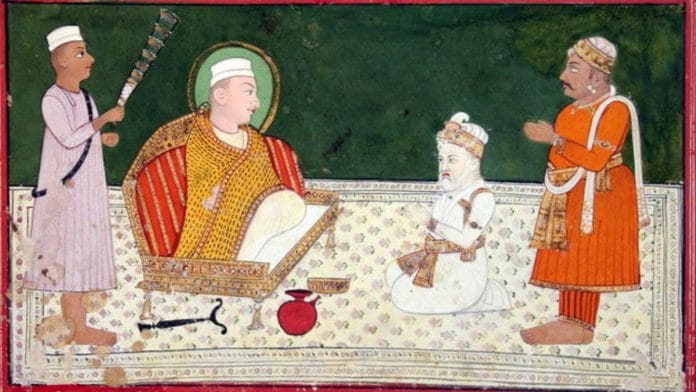While Hamid al-Din chose to settle in rural north India, Qutb al-Din Bakhtiyar Kaki, the other celebrated disciple of Khwaja Muin al-Din, chose Delhi to settle down and carry out his spiritual activities. He was born in Aus, an important centre of activity for Sufis following the Hallaj tradition, in the province of Jaxartes.
As he grew older, Qutb al-Din moved to Baghdad, the most famous centre for Sufi activities in the twelfth century. There he met Khwaja Muin al-Din in the mosque of Imam Abul Lais Samarqandi and immediately took to his discipleship, ignoring eminent Sufis like Abdul Qadir Jilani, Shihab al-Din Suhrawardi, and Auhad al-Din Kirmani.
After his training in Baghdad, when Khwaja Muin al-Din left for India, Qutb al-Din travelled further through Khurasan and Multan, before making his way into India out of a deep desire to meet his master.
When Qutb al-Din was travelling through Central Asia and Iran towards Lahore and Delhi, the entire region was torn apart by political instability. Immediately after the demise of Ghiyas al-Din Muhammad, the western domains of the Ghurid Sultanate fell into the hands of the Khwarazm Empire, who were steadily advancing eastwards.
Threatened by the formidable Khwarazm Sultan, Muiz al-Din Muhammad left his possessions in India in the hands of his trusted slave General Qutb al-Din Aibak and hastened towards Ghazna. He was assassinated in Damyak, and the entire Ghurid kingdom in Afghanistan came under the control of the Khwarazm Shah. However, the latter soon faced the fury of the Mongols from the north, who wreaked havoc across West Asia.
Under the command of Chingiz Khan, the Mongols not only razed the Khwarazm Sultanate to the ground, but the last Khwarazm Shah, Jalal al-Din Mangabarni, suffered an inglorious defeat at the hands of the Mongols in 1221. Pressing political situations in the west required the attention of Chingiz Khan, which fortunately spared Delhi from the wrath of the Mongols, allowing Sultan Iltutmish to consolidate his realm further by gradually eliminating his opponents in the Punjab region.
Also read: How Jamini Roy infused his art with India’s folk traditions
It was in such political turmoil that Qutb al-Din Bakhtiyar Kaki arrived in north India. While passing through the Punjab he stopped at Multan in 1214, when Nasir al-Din Qubacha was the governor. Qutb al-Din renewed his acquaintance with Baha al-Din Zakariyya, the Suhrawardi Sufi master. During the course of his stay the Mongols attacked the region, possibly pursuing the Khwarazm Shah.
Nasir al-Din Qubacha, fearing defeat in the hands of Mongols, approached the Chishti saint for help, who gave the governor an arrow and instructed him to shoot it at the direction of the Mongol camp after evening prayers. Nasir al-Din Qubacha did as instructed, and the next morning the Mongols were said to have retreated from the region.
Though the Mongols retreated purely for political reasons, the fame of Qutb al-Din as a powerful saint spread phenomenally. Multan was already under the spiritual authority (wilaya) of the Suhrawardi saint Baha al-Din Zakariyya. Once Qutb al-Din had expressed his desire to settle there, he was given a cup of milk by Baha al-Din, which was filled to the brim.
This was a gentle message that the region had no place for another Sufi saint, and that the Chishti master needed to move on and look for a fresh territory in which to settle down. After this clear message, Qutb alDin had to turn down repeated requests from Nasir al-Din Qubacha to settle in the region, and moved further east until he reached Delhi sometime after 1221.
In Delhi he was warmly welcomed by Sultan Iltutmish, who was visibly happy to receive the Chishti saint in his capital, away from the domain of his political rival Qubacha.
The presence of Qutb al-Din Bakhtiyar Kaki in Delhi helped to legitimize the nascent authority of Iltutmish as the Sultan, who was yet to establish his complete control over his rivals. In the history of the Delhi Sultanate, this remains one of the earliest instances of a Sultan seeking legitimacy from the presence of an eminent Sufi saint within his realm.
Many more instances would follow. But for Iltutmish, aspiring to be in the position of unquestioned authority within the Delhi Sultanate, securing the blessings of the disciple of the revered Muin al-Din Chishti was a great support to his rule, which was being challenged by the same governor of Multan who had tried to retain Qutb al-Din within his own domain, though without success.
 This excerpt from ‘Sufi Rituals and Practices: Experiences from South Asia, 1200–1450’ by Kashshaf Ghani has been published with permission from Oxford University Press.
This excerpt from ‘Sufi Rituals and Practices: Experiences from South Asia, 1200–1450’ by Kashshaf Ghani has been published with permission from Oxford University Press.






